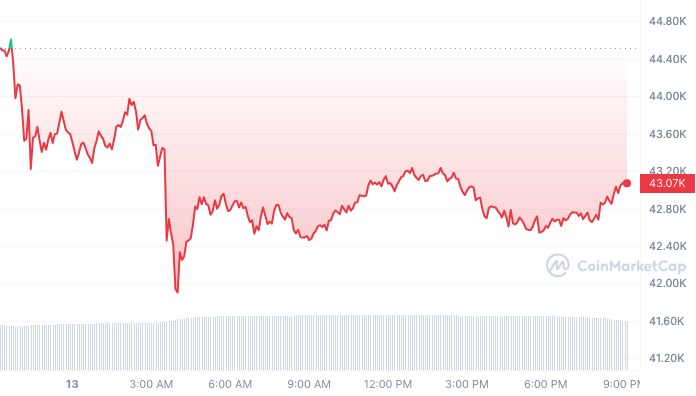
Introduction
In the dynamic world of cryptocurrency, a sudden Bitcoin Price Drop often triggers widespread speculation and concern. Recently, we’ve witnessed such a downturn, despite the highly anticipated approval of spot Bitcoin Exchange-Traded Funds ( Bitcoin ETFs) in the US. This article aims to dissect the factors contributing to this unexpected decline and provide insights into the future implications for the market.
Market Dynamics and Investor Behavior
One of the primary factors behind this drop in Bitcoin’s price by about 6% is attributed to the classic “buy the rumor, sell the news” phenomenon. Traders who had speculated on the ETF approval and bought Bitcoin in anticipation might be cashing in on their investments now that the Bitcoin ETFs are live. This type of profit-taking behavior is common in financial markets, where news and rumors can significantly influence short-term price movements. This kind of profit-taking often leads to a temporary dip in prices following a significant news event.
Technical Analysis Insights
A deeper look into Bitcoin’s technical analysis reveals that the cryptocurrency broke through several key support levels post-ETF launch. Notably, the price dropped below the crucial $46,000 mark, a resistance zone that many hoped would hold as a support level. Additionally, Bitcoin failed to surpass a significant Fibonacci retracement level, indicating a potential bearish outlook in the short term and possibly triggering further sell-offs.

Institutional Interest and Trading Volume
Contrasting this price drop, the trading volume of the newly launched spot Bitcoin ETFs tells a different story. On the first day alone, these ETFs saw a trading volume exceeding $4.6 billion, indicating robust investor interest. This volume, primarily driven by heavyweight firms like Grayscale, BlackRock, and Fidelity, suggests a growing institutional adoption of Bitcoin, which could bode well for its long-term valuation and stability.
Conclusion
Given the current market dynamics, especially with the recent approval of Bitcoin ETFs and the subsequent price movements, investors should consider the following steps:
- Stay Informed and Analyze the Market: Understanding the factors behind the current price movement is crucial. Keep an eye on market analyses and news related to Bitcoin and the broader cryptocurrency market.
- Review Investment Goals: Investors should reassess their investment goals and risk tolerance. The cryptocurrency market is known for its volatility, so it’s important that your investment strategy aligns with your financial goals and risk appetite.
- Diversification: Consider diversifying your investment portfolio. While Bitcoin and Bitcoin ETFs are appealing, having a mix of different assets can help spread risk.
- Consult Financial Advisors: If you are uncertain about your next move, consult with a financial advisor who can provide personalized advice based on your financial situation.
- Avoid Panic Selling: It’s important not to make hasty decisions based on short-term market movements. Historical data often shows that markets can rebound from downturns.
- Consider Long-Term Potential: Think about the long-term potential of Bitcoin and how it fits into your investment strategy. While the market might be experiencing fluctuations now, consider how it might perform in the long run.
- Stay Cautious with New Investments: If you’re considering investing in Bitcoin or Bitcoin ETFs now, be cautious. Ensure you understand the product, its risks, and how it fits into your overall investment plan.
- Monitor Regulatory Developments: The cryptocurrency market is subject to evolving regulations. Stay informed about any new regulations or policies that might affect your investments.
Here are some official websites to monitor for regulatory updates:
- U.S. Securities and Exchange Commission (SEC): The SEC website regularly posts official news, regulatory updates, and press releases concerning securities, including those related to cryptocurrencies.
- Financial Industry Regulatory Authority (FINRA): FINRA provides updates on its website regarding regulations and compliance information, which can include cryptocurrency-related matters.
- Commodity Futures Trading Commission (CFTC): The CFTC’s site is another key source for regulatory news, especially regarding commodities and derivatives that may involve cryptocurrencies.
- European Securities and Markets Authority (ESMA): For updates within the EU, check ESMA’s website for regulatory news and publications on various financial instruments, including digital assets.
- Financial Conduct Authority (FCA) – UK: The FCA’s website offers news and information on financial services regulations in the UK, including cryptocurrencies.
